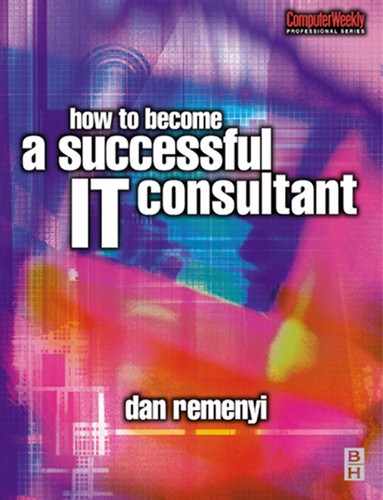Setting up your IT consultancy |

Even today's most careful students of organisations will readily admit that they lack adequate models to predict corporate success. Recall how widely we celebrated such New Age cultures as People Express, Atari, and Rolm. Ardent supporters include academics, consultants, business journalists, and seasoned executives. Our former enthusiasm becomes a source of embarrassment when we hold ourselves accountable for predictive accuracy.
Pascale, R., Managing on the Edge, Penguin Books, London, 1990.
Before beginning to think about how to set up your IT consultancy business you need to have clearly answered for yourself three important questions, which effectively will define your business strategy and focus your activities and which in turn will affect how you set up your new business.
3.1 Three focusing questions
1 Precisely what service is it that you are going to be offering to deliver to your clients?
2 To whom exactly are you going to be offering?
3 Specifically why will anyone want to buy from you?1
These three questions are fundamental to all businesses, ranging from the start-up IT consultants to large global multinational businesses, and without a clear view as to how you will address these issues you will not have a business. In fact without being able to convincingly answer these questions you had better not start out on a business venture of your own. The answers you come up with need to be objective, i.e. not just answers you personally like or your mother-in-law likes.
The first question is the ‘what’ of your IT consultancy. The range of services which you could offer as an IT consultant is quite substantial and it includes assisting companies with the selection of hardware, software and personnel. IT consultancy also includes the preparation of systems involving such tasks as project management, risk management, systems testing and commissioning. It could also include staff training, information systems evaluation and advising on the alignment of information systems and corporate strategies.2 There are many more services you might offer as an IT consultant, and the above mentioned are only a few. The point is that you need to have a clear focus as to what it is you are offering.3
The second question is the ‘to whom’ of your IT consultancy. The issue of to whom you are offering this service is very important because there are different requirements in different market segments and different propensities to purchase IT consultancy. In the first place although there is a major need among small firms for IT advice, there is in general not much of a market here. The main reason for this is that small firms often do not have the necessary funds to purchase IT consultancy. This is not to say that there is no market for IT consultancy among small firms but it is a limited one and a difficult one in which to succeed. Bigger firms are more likely to buy IT consultancy. Some IT consultants specialize by industry and thus some aim their services at transport firms or hotels or retailers or at municipal councils to name only four possible industry sectors. There is also the question of who it is in the organization that is likely to support the employment of the IT consultant. This will usually be the IT manager4 or a general manager or a director. The organization's accountant or financial manager or director is also a possible purchaser of IT consultancy.
The third question is the ‘why’ of your IT consultancy, and this is perhaps the most difficult on which to generalize. You will be employed as an IT consultant only if you are able to convince your potential client that you are an expert in your field. You will have to have outstanding references.5 You will have to be clearly achievement motivated. You will have to be available when the client requires your services. You will have to price yourself competitively. It will be essential that you deliver value for money. You will need to clearly articulate your value proposition to your clients and continuously make sure that they keep this in their minds.
As you can see being an IT consultant is no pushover. In fact in many ways it is actually quite a tall order.

…PRESENT THE IDEAS TO YOUR BANK MANAGER …
You need to test your views about why you should succeed as an IT consultant in the harsh business world. One way to do this is to present the ideas to your bank manger while asking him or her for a substantial loan to fund your business. By the way, completely on the side, banks very seldom fund a consultancy business as it is thought that by the very nature of business consultancy this type of enterprise should be largely self-funding. This is because if properly managed a business consultancy should not need extensive setup capital nor should it need much by way of working capital. There is seldom any need for a consultancy business to invest in expensive equipment and there is hardly ever any need for a consultancy to purchase inventories for resale. Banks and other lending institutions are really interested in funding only these types of physical assets. But it is certainly an essential experience for anyone who is thinking of setting up an IT consultancy business to talk to his or her bank manager.
Professional Service Firms
Your IT consultancy will be a Professional Service Firm. Professional Service Firms are not regarded as good risks by banks who want the organization to whom they will lend money to have fixed assets or at the very least assets such as inventories. Therefore you will need to fund your IT consultancy in ways other than overdrafts. Fortunately if you are careful you may not need too much money to get started.
But back to business strategy – these three questions are the underpinning of the business strategy from which the business plan is created. You need to develop a business plan as part of the process of setting up your IT consulting business. If you get your strategy wrong at this stage then your subsequent planning will be based on false premises and you may very well not succeed.
Having decided on your business strategy there are many different ways in which you may set yourself up as an IT consultant. There is no right or wrong way and the actual route you eventually choose will be entirely dependent on your personal circumstances and preferences. It is important to realize that you will be creating your own business and that you will be running the show in the way that you want to and that subject to keeping your clients satisfied you would have quite a lot of latitude as to how you can actually do this.
Here are some of the issues you need to consider right at the very outset of your venture into business.
3.2 Form of business
Are you going to be a sole trader working by yourself or will you start out with a business partner?
There are many pros and cons to being either entirely on your own as opposed to having a business partner from the outset. The main issue is that being entirely on your own means that you have very definite restrictions in that you may not have someone to help with the large variety of things that need to be attended to when you start up. Also there is always the issue that when you first begin to work for yourself you may well miss the company of your former colleagues. In simple terms being entirely on your own is often perceived as being quite lonely and if you have a business partner this feeling may be alleviated. A business partner can have a number of important advantages including providing a sounding board for ideas and of course will bring his or her business contacts and additional funds for the business. It is also true that frequently two minds are better or at least can be more creative than one. However, it is worth pointing out that there is a risk associated with having a partner. In law each partner can be jointly and severally responsible for all the debts of the partnership. Thus if your partner were to engage in an extravagant binge and your business was to go broke you might have to pick up the whole bill if your erstwhile partner had no money of his or her own to contribute to paying the debts of the business. Also partners do sometimes fall out and this can lead to very unpleasant situations.

… WILL YOU START OUT WITH A BUSINESS PARTNER?
A variation of having a partner is for the IT consultant to approach an already established firm of consultants in another field such as marketing, finance or general management and suggest that this organization set up an IT consulting operation with you using their base of clients, etc. Accountants or lawyers are also possibilities for such an arrangement. Working with an already established business whereby the IT consultant uses his or her skills to develop a new market that will be shared by himself and the already established business is sometimes referred to as being in a strategic alliance. However, it is important to note that there is more to a strategic alliance than simply having a commission sales agreement with another well-established business. It is worth noting that these so-called strategic alliances frequently don't last very long, but they can be quite a reasonable way of starting out in the consultancy business.
However, having any sort of a business partner does not suit everyone and the rate of business partnership failure, although not officially published, will be at least as high as marriage failure and it can be a difficult, traumatic and expensive exercise to dissolve a business partnership. Having a bad or poor partner would certainly be much worse than having no partner at all.
Thus the question of whether you begin your business venture being either entirely on your own or having a business partner deserves considerable reflection and discussion before taking the plunge. It is probably true for most people that if they can get going without a business partner they will be better off. It is always possible to take a partner later if the need is really there.
3.3 To be or not to be a company
Are you going to operate as a limited liability company?
There are many financial, risk and tax implications to the decision as to whether you decide to be a limited liability company or just trade (in this case act as a consultant) in your own name or private capacity. Detailed financial and tax advice needs to be acquired from a qualified person, normally a chartered accountant or a lawyer. It is important not to rely only on hearsay advice as how you set yourself up will have implications for you for a very long time.

… RESPONSIBLE FOR ALL THE DEBTS
A key issue that may be addressed here is that of risk. A limited liability company means that if your business fails then you will not be personally responsible for all the debts the business may have run up while it was in the process of failing. This is in contrast to the situation where, if you are trading in your own name or private capacity and your business goes bust, then you will have to pay back every penny that you owe. When a business, which is owned by an individual in his or her own name or private capacity, goes bust the creditors may take just about everything which he or she owns and sell it to repay some of the businesses debts. This can include the family home and most of its contents. Limited liability can protect the start-up entrepreneur against such a catastrophic business failure and thus if prudently used may reduce the risk.
The first few weeks
It you set up a new office and start your IT consultancy as a limited liability company you may find that the first few weeks of your new business life will be taken up with tedious administrative details. This will involve buying your company, appointing accountants, finding an office to rent, leasing equipment, registering for tax, etc. Of course you can outsource this to some extent but you can't just ignore these issues. So you have to put time and energy aside to deal with these details and don't expect to be doing billable work immediately.
Limited liability is indeed a great asset, but it doesn't always offer quite as much protection as it seems to. In the first place there are various responsibilities that the director of a limited liability company has to comply with and if he or she fails to do this, the limited liability may be impacted. There is also the fact that when it comes to borrowing money or even obtaining a large line of credit from a supplier, small company directors are frequently asked to sign a personal guarantee for the amount involved. Signing such a guarantee is effectively waiving the benefit of the limited liability company because if anything goes wrong with the business the director who has signed the guarantee will have to pay up from his or her own resources.
In general it is usually thought that there is much benefit in operating the business as a limited liability company. Such a company may be established quickly by purchasing one ‘off the shelf’ from an accountant or a lawyer. It will usually come with a made-up name,6 which has been used for the sake of having any old name to begin with. You can then change the name to something that suits yourself. The set-up costs involved here need not be great, but there is an additional ongoing cost in having a limited liability company.7 Again if you have a successful business these amounts of money will not be a material consideration.
Having decided on the vehicle in which you are going to do business the next issue is to calculate your financial budget. This involves you in deciding a number of issues including:
1 How much money do you need to start up your IT consulting business?
2 What do you think your first year's or perhaps your first few years’ turnover will be?
3 What do you think your ongoing fixed costs will be?
4 What do you think your ongoing variable costs will be?
5 How much cash will you have or do you need?
3.4 The awkward question of capital
How much money do you need to start up your IT consulting business?
First, there is not much point in planning, and especially budgeting, too far ahead. Don't waste your time producing spreadsheets showing how you will do five years ahead. When you start out on the journey of having your own IT consultancy you will not be able to anticipate all the challenges and opportunities that will come your way. It is clear that one of the most important factors in any business success, but especially IT consultancy success, is being able to be flexible. So you may have to rewrite your financial budget a number of times even in your first year.
The amount of capital that you will need to set up your IT consultancy business may not be substantial and the actual sum involved will depend largely upon your ability to quickly find clients and earn income from them. Some IT consultants go on their own only when they have a client already signed up or nearly signed up. In such a case you may not need a lot of money, although this will ultimately depend on how quickly your clients actually pay your fees. Slow paying clients usually mean that a lot of working capital is needed and this is a major problem for all small businesses and the issue of when payment for services is actually due needs to be addressed right upfront.
Get the business going
A few years ago two prize winning MBA students decided not to follow the corporate career track but to set up on their own as IT consultants. To this end they set about developing a strategic plan. They commissioned market research. This was followed up by financial projections and cash flow forecasts. They then undertook a major service development exercise. Then they found premises and equipped their office and bought company cars. All this took up three months. Then they started looking for business. This of course was much more difficult than they thought and within six months of setting themselves up they were both in full-time employment with a big bill to pay for playing at setting up a business.
Besides finding your own income there are several reasons why you may need some start-up capital. You may have to replace a company car if you previously had one; you may need a bigger and better computer at home; you may need additional telephone lines and a mobile phone, etc.8 But all of this equipment may be obtained by using a leasing company without incurring capital expenditure. Of course, leasing is inclined to be an expensive way of funding your business, and it is certainly always more expensive than having your own money and buying the equipment outright. But when money is in short supply leasing may be the answer. By the way, the other disadvantage of leasing is that you will incur fixed monthly payments, which you will have to meet before you can draw any money from the business for yourself.
If you are not able to line up a client to start work with as soon as you leave your old job, then in addition to the money you need to equip yourself you will also have to have sufficient financial resources to sustain yourself until you begin to earn an income from your business. Of course you may also need some money to be spent specifically on marketing. You may wish to put an advertisement in an industry newspaper or professional journal. However, most start-up IT consultants don't do this type of promotion as it's expensive and its effectiveness is questionable. Start-up IT consultants usually market themselves by getting on the telephone and informing anyone who will listen to them that they are in business. This will only cost you your time and your telephone bill. Printing a stylish business card and having an attractive letterhead designed are also part of the cost of marketing your IT consultancy business as is the creation of a website which will explain who you are and what you have to offer. But all of this together will probably only come to a fraction of the cost of purchasing an advertisement in industry newspaper or professional journal.
There are no general rules as to how big a financial reserve you should have when setting up your business. Some individuals would feel quite comfortable if they had three months’ living expenses in the bank when they start the adventure of going on their own. Others would say that three months is not enough and they would want to have secured enough money for a year. The actual amount needed will depend upon how good your business strategy is and how well you execute it. However, do bear in mind that it is perhaps sensible to have whatever sum you think you need available to you in cash or some other financial instrument, which is similar to cash. Having the money in shares on the stock exchange is not the same thing because when you come to cash them in they may not be worth as much as you think.

THE ACTUAL AMOUNT NEEDED WILL DEPEND ON HOW GOOD YOUR BUSINESS STRATEGY IS …
3.5 A financial forecast
What do you think your first year's or perhaps your first few years’ turnover will be?
Estimating your turnover is always very difficult for start-up IT consultants. Even if you begin with a contract it may not last as long as you think. If you go out on your own cold you may be faced with three or six months’ canvassing for business before you land a first contract. There are a lot of variables involved here including how much you will be able to spend on advertising or promotion and of course how much you intend to ask as the daily rate for your services.
As an IT consultant your daily charge-out rate will always be determined by how much your clients are prepared to pay and this is referred to as the market rate or what the market will bear. If you are selling very general skills then the market rate will probably be rather low, but if you have specialist and sought after skills then you will be able to ask a much higher fee.9 It is also worth remembering that most IT consultants do not have one charge-out fee rate, but have several and the one in use will depend on the client they are working for and the length of the job. The charge-out rate on longer jobs is often substantially discounted.
The value of your services
Economists say that there are two ways of thinking about value. The first is to consider that there is value in use and the second way is to think about value in exchange. The easier of these two concepts is value in exchange, which says that the value of anything is the amount of money for which it changes hands and market forces establish this figure. At the end of the day this is probably the way that your fee rate will be established. Value in use on the other hand is about the positive things you will do for the organization which will allow them to perceive that you have made a real contribution to solving their problem and that you have personally been value for money.
Whatever your circumstances it is useful to perform some analysis on your expected or desired earnings and to think about what your charge-out rate needs to be. Also consider if the demand for your services is likely to be constant throughout the year, or if there is likely to be some sort of cycle in the demand. If there is a possible cyclical effect on the business you are expecting to acquire, then you will have to plan your cash flow even more carefully.
Assuming that you want to be a fairly well-remunerated IT consultant in the short term you may have a target gross income of-say, £100,000. Having established this figure you then need to work out how many days a year you expect to be able to invoice out your services to your clients. If you are an IT consultant working on your own the number of days that you may be able to invoice could be quite limited. For example, if you work on a 48 week year – this means that you intend to take four weeks a year holiday, which may be a bit too much in the early years of setting up your own business – and you take an average of one day a week for marketing your services and one day a week for keeping yourself up to date, you would find that you have only 144 days a year to sell. If this is your approach then to invoice out £100,000 per year you will have to achieve an average daily billing rate of £700. On the other hand if you take on a long-term contract and you feel that you do not need the one day a week to keep up to date you could have as much as 192 days a year to sell and thus invoice. Then again, with a long-term contract where you feel that you also do not need the marketing time and you will be able to stay up to date by reading at the weekends, you could have as much as 240 days to sell. This means that to gross £100,000 per year, your average daily billing rate need only be a little more than £400. By the way, if your ambition is to gross £200,000 or £300,000 just double or triple the figures discussed here. But of course you had better be realistic about what is achievable if you don't want to be disappointed.
Low fee consultancy
Some of the most successful IT consultants I know operate on really low fees. They do this on the basis that they know if they charge a small amount they will be offered long-term assignments. The type of work they do is usually but not exclusively related to project management or to IT training course development. In this case they are acting much like contractors which suits their particular personalities.

… YOU HAD BETTER BE REALISTIC …
However, always remember no matter how you calculate these figures what really matters is how much the client will pay and you need to be prepared to accept a reduced fee for a longer job. It is always useful to know what other IT consultants are charging for similar services to those you are offering. You should always keep this type of benchmark in mind because charge-out fee rates can go down in times of recession and you need to make quite sure that you are not out of line.
Having considered what gross turnover or revenue might possibly be for your first year it is useful to think about how this might grow or develop over the next few years. However, the watchword here is to be flexible and don't think that having a revenue plan guarantees that your business will turn out the way you expect or hope. Always be prepared to tear up your plans and rethink if you find that the market is not responding in the way that you thought it would. Only fleet-of-foot opportunists survive in the world of IT consultancy and it is quite probable that you will have to reinvent yourself several times in the first few years of your being in business.10
3.6 Fixed costs
What do you think your ongoing fixed costs will be?
Having considered the initial once-off start-up costs and the revenue side of the income equation it is then necessary to carefully examine the likely ongoing costs of running your business.

FIXED COSTS
These ongoing costs can be considered under two main headings. The first of these are fixed overhead costs which you will have to meet no matter what else happens and the second are variable expenses which will fluctuate depending on the type of work you are actually doing.
As an IT consultant you may be fortunate enough to have only a small amount of fixed overhead costs especially if you first set yourself up in a small way. On the other hand if you want to start your business with a big splash you may need a lot of money.
The main fixed overhead costs you are likely to face are your salary, your rent, your business travel, your equipment costs and sundry other professional costs. As a general rule the lower the overhead costs the better. This rule is true for big and small businesses as well as for start-up operations or for those businesses that have been in existence for years.
It is often the case that in the first few months of operating his or her own IT consultancy it is necessary for the start-up entrepreneur to be flexible in terms of how much salary is taken from the business. If clients are paying good fees then there is no reason why attractive salaries cannot be taken. On the other hand if the business is slow to start then the entrepreneur may need to hold back in paying him or herself and reserve whatever capital he or she may have. This is a very personal issue and depends upon the inclination and expectation of the individuals concerned. But in many cases some sort of salary will need to be budgeted for right from the start of the business.
The second ongoing cost issue is the office rent. This is an especially important issue as rent can be a considerable expense especially in the early months or in fact years of a business.
Some IT consulting businesses may need to acquire a considerable office area and these offices may have to be in an expensive part of town adjacent to clients or prospective clients. On the other hand other IT consultants can actually have their offices anywhere. In fact they can sometimes work from their study or spare bedroom at home. It is becoming increasingly acceptable for IT consultants to work from home and one of the main limitations is the availability for the extra room in the house and the necessary peace and quiet required to get on with the work involved. A successful IT consultant will probably spend a considerable amount of time on his or her clients’ premises so the need for an office is largely to do with a place to be when the consultant is not engaged in billable work.
If it is not thought to be appropriate to work from home then there are a large variety of office facilities that are specifically aimed at small start-up businesses. These are office and administrative sharing arrangements and a small amount of space and message taking capability can be acquired for a modest amount of money. Sometimes these office facilities will also offer administrative, secretarial and bookkeeping services. Do not underestimate the importance of this type of service for if you do not keep the records and other legal documents of the business in good order you will soon find yourself in difficulty with a number of government agencies. An administrative mistake, which some small start-up businesses sometimes make, is not to take proper care of the monies which they have invoiced for VAT. Monies invoiced and received for VAT do not belong to the business, as these amounts have to be regularly paid to the government. Spending this money and not having it available when it is due can lead to very severe consequences, including having to suspend one's business activities while one serves a period of time at the Government's convenience in order to square one's debt to society.11 Administration is always a fixed non-discretionary cost, which will have to be paid each and every month.
In negotiating any office arrangements be careful about the duration of the contract you are asked to sign. Office leases can be very long. You probably should avoid signing up for 5 or 10 years. Office and administrative sharing arrangements are usually short term but there may be a requirement to give three months’ notice when you decide to leave. Always look at the fine print of such leasing agreements.
If you have reasonable keyboard or typing skills you will not need secretarial support. However, if you are not skilled in this regard then you should identify a local person who will be able to produce proposals and reports when you require them. This can usually be arranged on a relatively casual basis and be paid for on an hourly rate.
As a general rule the closer your office is to your home the more convenient you will find it.
In the early weeks and months of your IT consulting business you may need to personally call on a large number of potential clients. Sometimes this can involve considerable travel costs and even overnight accommodation, and depending on where you are based and where your potential clients are this travel activity can be quite expensive. It is nearly always better to find business close to home but sometimes this will just not be possible. The amount of speculative travel may reduce once the business is up and running, but in any case it will probably be funded from ongoing revenue. In this category of cost you will also want to budget for a motor car. All these travel costs need to be carefully budgeted.
With regards to equipment costs these may be minimal especially if the necessary car, computer, fax, photocopier, mobile phone,12 etc. can be purchased at the outset. On the other hand if all these are leased, and especially if a company car is leased, then these charges could be substantial. Like the rent, these costs will be fixed and need paying each and every month.
Sundry other professional costs are intended to catch all items which will include such expenses as stationery and business cards, insurance, secretarial and administration costs, professional society membership, purchase of books, fees to attend courses to mention only a few items. In total these should be relatively small but nonetheless need to be budgeted.
On the question of insurance you need to decide if you need professional indemnity insurance. Professional indemnity insurance covers you for the risk of your making a serious mistake and being sued because of the consequences. Some IT consultants feel that the cost of this type of insurance is worth the peace of mind it can provide.
The above costs cover all the major categories of ongoing fixed overhead costs that most start-up IT consultants will need to consider.
3.7 Variable costs
What do you think your ongoing variable costs will be?
The next task is to consider the issue of variable costs.
From an IT consultant's point of view there are relatively few variable costs that will not be recharged to the client. Many consultants will ensure that their travel and accommodation costs while working for the client are directly rechargeable back to the client. But this is not always the case. Sometimes travel and accommodation costs have to be absorbed by the consultant and if this is the case these costs need careful budgeting to ensure the job is adequately profitable.

VARIABLE COSTS
Remember that you may be accustomed to travelling business class or full economy, and staying in top class hotels, but that travel and accommodation can be bought for much less if you travel economy or with, for example, discount airlines, etc.
Sometimes the IT consultant will need to produce a report and a number of different types of costs may be associated with this.
These costs might include market research, data analysis, typesetting and reproduction. Like travel and accommodation costs these costs may be directly rechargeable back to the client; on the other hand they may not and this should be clearly established at the commencement of the job.
Bringing the start-up costs together with the revenue plan and the ongoing costs will provide you with a financial budget, which will be an important tool and a guide to you in deciding how to manage your fledgling business. Your next step will be to convert this financial budget into a cash flow plan.
3.8 Cash flow
How much cash will you have or do you need?
The cash flow plan is built up from the data that is used for the financial budget, but as well as estimating what things will cost and how much you will earn, you also need to take into account exactly when you will be paid and when you will have to pay your own bills. By producing the cash flow plan you will know exactly how much cash you will need to borrow or how much extra cash you will have on hand. This is especially useful in the early months of your business when your IT consulting venture is being tried out. The amount of money that you will need to borrow and the salary you are sacrificing by having given up your previous job are effectively the amount of personal risk you are taking on by setting up your own IT consulting business.
3.9 What can the Internet do for you?
The Internet can now play a role in just about every aspect of our lives and setting up your IT consultancy business is no exception.
In the first place the Internet is a magnificent directory. So you will be able to use it to find all sorts of suppliers from business cards to motor cars to computer equipment to accounting services. This will be useful especially to help you compare terms and conditions being offered.
In its capacity as a directory the Internet will also contain details of IT consultancy offers. So you can easily see what the competition is saying and offering. This can give you ideas of how to pitch your market offering.

WHAT CAN THE INTERNET DO FOR YOU?
The Internet will also provide news and information about the IT business from which you can obtain ideas about which firms might be useful prospects for you to contact.
Once you have set up your business you will probably want to have a website for your IT consultancy business. You need to give a lot of thought as to how you present yourself on the Web and you need to take into account that fact that a website can produce a lot of enquiries that may not lead to any business.13 So from a business assignment acquisition point of view do not have too great an expectation of what the Web can do for you. Some consulting work may well come to you through your website but don't count on it. It is certainly important to have a Web presence but at least in the early days of your IT consulting business you should not put too much reliance on it to produce business.
3.10 Getting going
Setting up your IT consulting business does take time. If everything works well then you can make all the arrangements you will need in a few days or perhaps a week, but on the other hand it could easily take several weeks. So give yourself enough time. It isn't necessarily a good idea to have to share your attention between setting up your business and doing your first IT consulting job, although this has been the way many people have started their business. There is enough stress in either of these two activities never mind both together.
Making all the arrangements described in this chapter does not mean that you have a business. Only when you have a satisfied client who has paid your fees do you really have yourself a business at all. Never lose sight of this fundamental fact.
3.11 Summary and conclusion
There are actually two types of work required in setting up your IT consultancy business. The first of these is the thinking through of all the strategic issues including how you will target your business and what sort of strategic alliances you will be looking for. The second is the work required to actually set up the physical arrangements such as the office and the bookkeeping, etc.
Take time to get all this right, as you really don't want to start your business off on a bad footing. The time needed to fix problems arising out of not setting yourself up correctly can often be much greater than the time needed to do it right in the first place.
3.12 Checklist
Things to think about and do when setting up your IT consultancy
1 Exactly what IT consultancy service you intend to offer and who is your target market and why they will buy from you.
2 Decide if you are going to be entirely on your own or be in some sort of partnership or strategic alliance. If the latter, sort out the responsibilities and the sharing of costs and revenue with your partner or strategic ally before you proceed any further. Make sure all these details are clearly understood and written down.
3 If you decide that you want to work as a limited liability company then have your accountant or lawyer set up a company for you. Buy a company off the shelf and then change its name.
4 Make sure you identify who will look after your administration including your billing, payments, your returns to the Companies Office and the VAT office.
5 If you don't type or use a word processing package confidently then identify who will produce your proposals and your reports.
6 Make a list of the hardware and software you will need. A motor car, a computer, a mobile phone, a photocopier, etc.? A word processing package, a graphics or presentation creation package, a spreadsheet, etc.?
7 Decide what the cost of this equipment will be and if you can afford to buy it all new or if you need to look for secondhand gear or whether you need leasing finance. Be clear in your mind that leasing is very expensive and avoid this if you can.
8 Are you going to rent office space or are you able to work from home?
9 Work out how much your charge-out rate will be. Find out what other IT consultants are charging for similar services. Remember that ultimately your clients will decide how much they will pay you.
10 Write some terms and conditions that you can show your clients. These need to include when you expect to be paid for your services.
11 Make a list of your fixed ongoing costs. The lower the fixed costs the more successful your business is likely to be. Remember that you may have to be flexible about how much salary you can take from the business.
12 Think about the variable costs you are likely to face.
13 Use your estimates of capital costs, revenue and ongoing costs to produce a cash flow plan.
14 Don't expect to be able to set up your business in an afternoon.
15 It is worth taking time to set up your IT consultancy business well because if you do this correctly it will prevent hassles and save you time in the future.
16 Never kid yourself! There will be complications at every stage, and revenue remains, even for you, so very different from profit.
1 These three questions should be the continuous mantra of every business or at least every entrepreneur. Once you lose sight of these the business's survival is definitely in question.
2 The term IT consultant is in fact extremely broad and it is often surprising just what activity can be classified under this heading. There is no source of authority to say what is IT consulting and what is not. People just use the language differently.
3 All businesses have to cope with the dilemma that to succeed they need to be highly focused, while at the same time they need to be sufficiently flexible so that if the market for their products and services changes they can quickly respond and change as well.
4 It is important always to bear in mind who actually brings the IT consultant into the organization as that person will no doubt be the IT consultant's strongest supporter and friend. If the IT manager did not personally request the assistance of the consultant this can cause the consultant headaches.
5 The question of references is in fact a thorny one. Not every potential IT consultant will be able to leave his or her firm with a good reference. Sometimes it's just the chemistry which hasn't worked and the individual can be forced to leave under a cloud. On the other hand a completely incompetent individual can negotiate a ‘good’ reference as part of a severance package. If you can't obtain an outstanding reference from your employer you will need to find other people who will have good things to say about you and who will put those words in writing.
6 Lawyers and accountants who specialize in setting up companies sometimes invent names like Disklore or Disklike or Herefor or Justdoor in order to have some temporary name which the Registrar of Companies will accept. When these companies are actually activated their name is usually changed to something meaningful to the people who are running it.
7 These ongoing costs are mainly to do with annual returns to the Companies Office and if you grow beyond a certain size your company will need to be formally audited.
8 If you can get yourself registered for VAT quickly then you will be able to get back from the VAT authorities all the tax that you will have paid on these capital purchases. This is irrespective of whether or not you are a limited liability company or simply trading on your own. However, the VAT authorities need convincing that you are about to become a serious business before they will allow you to be VAT registered and this can take a little time. It is often worth trying to get VAT registered quickly.
9 It is not possible to be specific about fee rates, but a low fee for an IT consultant might be in the order of £300 to £400 per day, while a high fee could be £2,000 to £4,000 per day.
10 There is a very delicate path to be followed here, which is truly the bane of all consultants’ existence. If you chop and change too much you will not succeed because it takes time for you to sort out what you are really doing and what you can really offer the market. It also needs time for any businesses to develop. Therefore perseverance is a critical success factor. On the other hand many start-up businesses just don't begin life with a viable idea and the only way that the entrepreneur will keep going is to pick up a new or better idea and run with it. Perhaps knowing when to hold the idea and when to fold the poor idea is the ultimate difference between winners and losers. This is the same advice that is given to poker players in the song ‘you have to know when to hold them and you have to know when to fold them’.
11 Start-up businesses can find the VAT they receive a very useful contributor to their cash flow. In effect you can see VAT, which you receive, from your clients as a sort of borrowing from the Government until your VAT payment date arrives. However, it is normally a very short-term loan as it has to be paid on the due date. If you can't pay your VAT you are likely to be in very serious trouble.
12 By the way, for an IT consultant setting him or herself up in business on a tight budget there is a second-hand market for all this type of equipment which can substantially reduce the outlay. For most purposes this sort of equipment will be perfectly adequate and can save a lot of money.
13 One example of this is the fact that offering IT courses and conferences on the Web led to numerous enquiries from individuals in far-away countries who really had no interest in attending these events but who had the time to attempt to engage in dialogue with the course providers.

